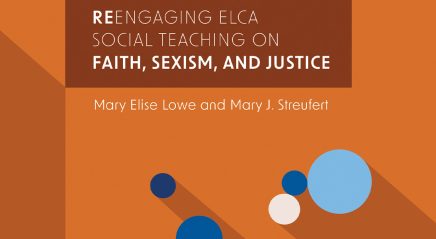Series editor’s note: In 2025, “Deeper understandings” is focusing on the ELCA social statements. We hope to reintroduce them to readers as a means of provoking fruitful, enriching conversation between Christians with different understandings and convictions, and as a springboard for active discipleship in the world. Each article will introduce a particular statement and its Lutheran theological underpinnings, then suggest ways in which it can spark faithful conversation and action in the service of your baptismal vocation.
My hope is that you will find this series relevant to your current context and that it will help you express your Lutheran faith in your daily interaction with family, friends, neighbors and co-workers—for the sake of the flourishing of the gospel of Jesus Christ in the world and the life abundant of the neighbor and stranger.
—Kristin Johnston Largen, president of Wartburg Theological Seminary, Dubuque, Iowa, on behalf of the ELCA’s seminaries
Adopted in 2007, the ELCA social statement “Our Calling in Education” is nearly two decades old. Reading it now reminds us how much things have changed yet how much Lutheran theology still has to offer our yearning and sorrowful world.
Consider for a moment that “Our Calling in Education” predates Instagram (launched in 2010), TikTok (launched in 2016) and the COVID-19 pandemic (declared in 2020). In some ways, the statement now seems thoroughly dated. Pages and pages express concern about specific policy issues related to learning across the lifespan: family faith formation, early childhood education, elementary and secondary education, colleges, universities and seminaries. Homeschooling is mentioned only once (on page 35 of a 66-page statement), and there is no mention of digital technology or the revolution in learning that was just about to commence.
Reading the statemet now reminds us how much things have changed yet how much Lutheran theology still has to offer.
Still, having noted the statement’s historical context and our current one, we must also recognize that its theological framing remains highly pertinent and astute. Education is a baptismal vocation. It is a process, a commitment, tied to two central assertions of Lutheran life: that we are baptized into community by God’s enormous grace and that God’s grace calls us to love our neighbor.
Centering those profound convictions, we can recognize our human brokenness and the varied ways in which we are called to live. As the document notes, “Sin’s power persistently warps and corrupts human learning and educational institutions. Our lives are marked by ignorance—the opposite of knowledge—and by folly—the opposite of wisdom” (page 6).
We must always understand our knowledge as partial, as contingent, even though it is rooted in the triune God, who is active in all our learning, our teaching, our knowing. Thus “we approach education with awe, wonder, and gratitude to the triune God” (page 6).
This is a centered-set conviction out of which all else flows. In the chaotic and polarized context of 2025, we can rest in the knowledge that “justified before God by grace alone, through faith alone, on account of Jesus Christ alone, Christians do not look to human learning, teaching, and knowing as means to reconcile us with God. Our lives do not receive ultimate meaning by how much learning or academic recognition we have. The gospel frees us from judging our human worth and that of others by their education or any other accomplishment” (page 8). We are learners, our integrity rooted in Christ.
Disciples of Christ as learners
We are freed to witness to the triune God and are called not only into the personal space of family life, where we encourage each other to grow in faith and love, but also into the collective spaces of civic life. “Our Calling in Education” blesses the complexity of widely varied contexts.
Is public education a common good? Yes, of course—yet the statement recognizes that families may choose to place their children in religious schools. This both/and framing of education demands that we wholeheartedly embrace all our neighbors, not simply those who are “like us.”
The most important and relevant conviction of this statement, even two decades later, is that education is communal, embodied, centered in Christ and deeply contextual. To be a disciple of Christ is to be a learner, and to learn is to risk one’s current understanding. This is a gift that frees us to love without fear, to lean into learning, into education, with a passionate desire to perceive the world in all its fullness, brokenness and creaturely witness to God.
Therefore, in the spirit of this social statement, which encourages our ongoing engagement with knowledge and truth in all contexts, I offer the following questions for our shared reflection:
- How do we conceive of truth in this chaotic world?
- How might churches help people find their way into learning that is grounded in Christ and thus open to the world?
- How does the Lutheran conviction that we are both sinners and saints help us to engage beyond polarization?
- How does education help us to practice love of neighbor even as the world burns in divisiveness and anger?
Get this column in your inbox: Visit livinglutheran.org/subscribe and sign up for the free email digest “LL Stories.” Receive the digest weekly, biweekly or monthly, and select the categories that interest you. (“Deeper understandings” is a “Voices of faith” column.)









